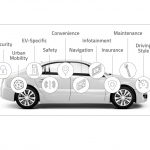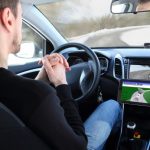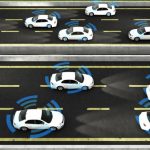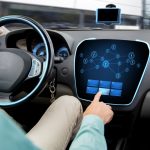Android vs. BlackBerry Round 2: The battle of car operating systems

BlackBerry has a pretty decent market share. When was the last time you heard that sentence? If you're talking about smartphone competition, it's been a while. In the world of in-vehicle operating systems, however, a new story is beginning to unfold.
As with its phone business, BlackBerry has a storied history with in-car telematics, with a footprint dating back more than 20 years. Its most relevant current presence, though, goes back to 2010. That's when BlackBerry (then known by the now-defunct parent company name Research in Motion) acquired the Unix-based embedded operating system QNX.
The rise of the connected car

Everyone thinks autonomous, self-driving cars are the next big opportunity in the automobile industry -- but it is the connected car that will drive the next major transformation in car owners’ driving experience. Previously, low-bandwidth cellular network connectivity and immature, cobbled-together proprietary technologies prevented automobile manufacturers from fully realizing the potential of the connected car.
However, with the arrival of standards-based, broadband-enabled turnkey connected car platforms, automobile manufacturers can finally make cars an integral part of the Internet of Things (IoT) and offer drivers mobility, preventive maintenance, infotainment and other connected car services that deliver a significantly better driving experience. In addition, the rise of the connected car will be a powerful force driving the development of the technology and infrastructure required to build a real path to a self-driving car future.
Aspiring drivers don't want electric cars, are concerned about autonomous vehicles

Aspiring drivers may be more conservative than you think when it comes to electric and self-driving cars. According to a new report by Elegant E-Learning, most of the folks studying for their drivers license are still very much interested in petrol-powered cars and have concerns about the benefits of self-driving vehicles.
Elegant E-Learning polled over 200,000 aspiring drivers in US, UK, Canada, and Australia and discovered that, if given the option between an electric and a petrol-powered car at a similar price, over 60 percent would opt for the latter. And that's interesting, because most respondents are Millennials -- they make up between 67.9 and 75.1 percent of the polled folks -- a group that is well known for its affinity for technology.
How will driverless cars impact the insurance industry?

In the next decade or so, it’s predicted that our roads will be awash with driverless cars, with estimates that they will account for a quarter of global car sales by 2035. This will present either a huge opportunity for the insurance sector or a challenge that could lead to its downfall. Car insurance has long been a lucrative business, generating billions of dollars in annual revenue and supporting thousands of jobs. So the disruption promised by driverless cars is a genuine concern.
The primary challenge comes from the fact that 90 percent of road traffic accidents are caused by human error, a risk that driverless cars have the potential to eradicate, sparking a significant improvement in road safety. And while safer roads are always a welcome development, the knock-on effect would be to cause the need for third-party damage insurance to almost disappear. With fewer accidents and fewer claims, Forbes estimates that premiums will reduce by as much as 75 percent.
The future of self-driving cars relies on big data

Autonomous cars depend on information. They’re equipped with technology to gather and communicate a vehicle’s position, speed, direction, and braking status. They also recognize traffic signals, proximity to pedestrians, and hazardous objects on the road. With voluminous data being computed in near real-time, self-driving cars can respond to dangers afoot or notify the car owner of imminent mechanical issues, in which case it might automatically set up an appointment with the nearest auto body shop.
In addition, self-driving vehicles aren’t disposed to human-prone errors resulting from distracted driving, tired driving, or driving while inebriated. They’re constantly alert, vigilant, and have a panoramic view of the road. All of this demonstrates how big data is becoming the cornerstone to the driverless car’s future. What’s more, it’s already making great strides toward self-driving capabilities, driver safety, and enhanced customer experience.
The challenges and promise of the connected car

The data from connected cars could reach a revenue potential of $1.5 trillion by 2030, according to a study from McKinsey. This connectivity will have a transformative effect on both consumer and commercial vehicles, well beyond previous advancements such as on-board diagnostics or airbags. Employers such as cable companies and delivery firms are very eager to further implement connectivity to monitor drivers and improve safety.
In the coming years connected cars will be a standard, acting as both hotspots and sending out information to other vehicles, toll booths, and various other sensors.
Microsoft and Nvidia unveil HGX-1 hyperscale GPU accelerator

Blueprints for a new hyperscale GPU accelerator have been introduced recently, jointly by Microsoft and NVIDIA. The two companies are saying the accelerator would "drive AI cloud computing."
The accelerator is called HGX-1 hyperscale GPU. It is released in conjunction with Microsoft’s Project Olympus, as an open-source design.
Intel buys Mobileye to boost self-driving car efforts

Intel is serious about becoming an important player in the self-driving car market. After teaming up with various companies, including car makers, to develop and promote solutions for autonomous vehicles, it's now taking things to the next level by acquiring Mobileye.
Mobileye, in case you are not familiar with it, is best known for supplying the technology (like sensors and cameras) used in Tesla's first-generation Autopilot. Intel will spend just over $15bn to buy the Israeli company.
Renault adds Android Auto to 2017 models

Advanced smartphone integration is a feature that more and more consumers will be looking for in a new car. Renault knows this, and to make its 2017 range more attractive to potential buyers it is now adding support for Android Auto.
The first models to have Android Auto support are the Espace, Kadjar, Mégane, Mégane Estate, Scénic, Grand Scénic, Talisman and Talisman Estate. Other models in the line, which are listed below, will also get the integration soon.
Ford makes $1bn investment in Argo AI to research and develop self-driving car tech

One of the world’s largest car manufacturers, US-based company Ford, plans to invest $1 billion to research and build artificial intelligence for its vehicles.
Ford states that it will invest $1 billion in the Argo AI startup within the next five years, which will focus on building and developing self-driving car technology.
Logitech ZeroTouch brings Amazon Alexa to the car

Using a smartphone while operating a car can be a dangerous affair. You obviously shouldn't text while driving, but sometimes using the device while moving is necessary, such as when using a maps app. Logitech ZeroTouch is an interesting Android-only solution that puts your phone into a special hands-free driving mode when mounted in a dock. It can be quite the elegant solution.
Today, Logitech announces that ZeroTouch is getting even better. The company is adding Amazon Alexa support, meaning you can call upon the voice assistant while in the car. Quite frankly, as great as Alexa is in the home, the assistant should prove equally as valuable in an automobile too.
New York City gets 'ParkNYC' parking meter mobile payment app for Android and iPhone

New York City is a wonderful place to visit. There are countless great restaurants, not to mention museums, Madison Square Garden, and of course, Broadway shows. True, it is a very expensive city, but it is totally worth it for the culture.
One of the worst things about New York City, however, is driving. Traffic is unbearable and totally chaotic -- it can be maddening. Even worse is parking your car. If you can even manage to find a spot (they are hard to find), you have to deal with meters -- some of which still use coins. Today, Mayor de Blasio announces that paying for parking in New York City is getting much more convenient. The all-new 'ParkNYC' app for Android and iPhone lets drivers pay to park using their smartphone.
Apple letter all but confirms plans for self-driving cars and commitment to privacy

We've known (or at least believed) for some time that Apple has been working on some form of automated vehicle, but the company has remained tight-lipped about what it is up to. Now, however, a letter to the National Highway Traffic Safety Administration (NHTSA) gives the strongest official hint that Apple is working on something.
The letter -- written by Apple's Director of Product Integrity, Steve Kenner, back in November -- has just come to light, in it Apple praises NHTSA's policies on automated vehicles, and stresses the importance of machine learning, data sharing, and user privacy in ensuring the development and safety of such technologies.
Intel creates Automated Driving Group

After announcing that it would supply Mobileye and Delphi with chips to power their autonomous driving systems, Intel has announced that it has created a new group that will focus solely on designing self-driving solutions.
Intel's Automated Driving Group (ADG) will be led by Doug Davis who will move from its Internet of things (IoT) group to act as senior vice president and strategic lead. Kathy Winter from Delphi will work under Davis, handling day-to-day operations and will act as the VP and GM of the new group.
BMW will invest €500 million in automotive startups

BMW Group has announced that its i Ventures division will be investing €500 million over the next 10 years on new car technologies in an effort to bolster its progress in developing autonomous vehicles.
The company's i Ventures division will use the money to invest in startups working on technologies such as autonomous driving and mapping that will allow BMW to improve its cars by making them both more intelligent and efficient.
Recent Headlines
Most Commented Stories
BetaNews, your source for breaking tech news, reviews, and in-depth reporting since 1998.
Regional iGaming Content
© 1998-2025 BetaNews, Inc. All Rights Reserved. About Us - Privacy Policy - Cookie Policy - Sitemap.